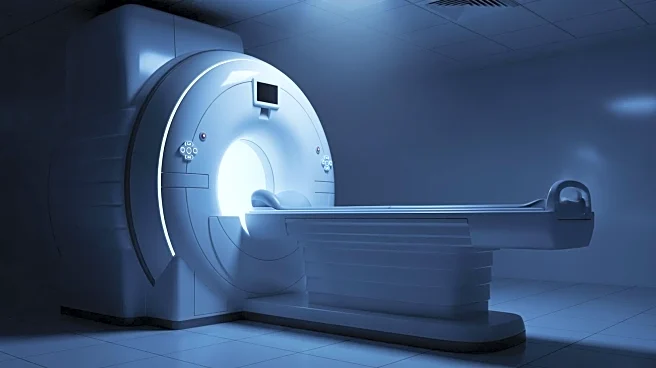What's Happening?
President Donald Trump recently disclosed that he underwent a magnetic resonance imaging (MRI) test during an unexpected visit to Walter Reed Medical Center earlier this month. The announcement was made
while he was aboard Air Force One en route to Japan. Trump described the MRI results as 'perfect' and stated that the doctors provided him with some of the best reports they have ever seen for someone of his age. This visit to Walter Reed occurred six months after his annual physical, raising questions about his health. The White House had previously released a statement indicating that Trump received 'advanced imaging' but did not specify the type of test. White House Press Secretary Karoline Leavitt did not confirm whether the 'advanced imaging' referred to an MRI. Trump's physician later issued a statement affirming that the president is in 'excellent overall health.' Despite this, Trump has been observed with swollen legs and bruises on his hand, which the White House attributes to chronic venous insufficiency and aspirin use.
Why It's Important?
The health of President Trump is a matter of public interest, especially given his age and the physical demands of the presidency. The disclosure of the MRI test and the subsequent reports of his health are significant as they address ongoing speculations and concerns about his well-being. The president's health can impact his ability to perform his duties and influence public confidence in his leadership. Additionally, Trump's comments about cognitive tests and his challenges to political opponents regarding their cognitive abilities have sparked discussions about the role of health and cognitive assessments in political leadership. These developments may affect public perception and political discourse, particularly as Trump remains a prominent figure in U.S. politics.
What's Next?
Further scrutiny of President Trump's health is likely to continue, especially as he remains active in political circles. The White House may face pressure to provide more detailed information about the president's health assessments and any future medical evaluations. Political opponents and critics may use these health disclosures to question Trump's fitness for office, potentially influencing public opinion and electoral dynamics. The president's health could become a focal point in political debates, particularly if he decides to run for office again. Additionally, the administration may need to address any emerging health concerns promptly to maintain transparency and public trust.
Beyond the Headlines
The focus on President Trump's health highlights broader issues regarding the transparency of health information for public officials. It raises ethical questions about the extent to which personal health details should be disclosed to the public and the potential implications for privacy and political strategy. The situation also underscores the importance of cognitive health assessments for leaders, which can influence perceptions of their capability to govern effectively. This development may lead to discussions about the standards and protocols for health disclosures in political contexts, potentially prompting changes in how such information is managed and communicated.










